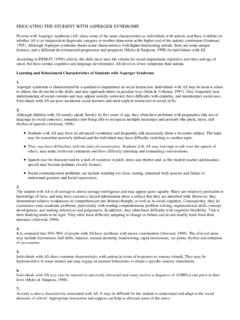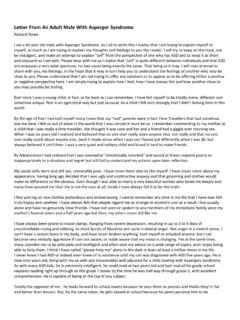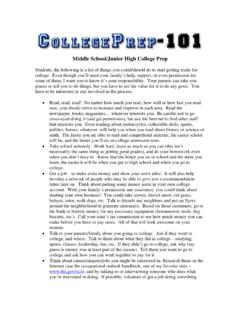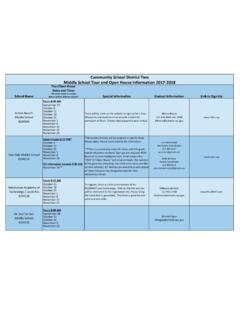Transcription of Surviving Middle School - aspen
1 Surviving Middle School by Elizabeth Lewandowski The move from elementary School to Middle School is a tough one for our children and for us as parents. Middle schools are larger, there are more students, and the change may be disorienting for our children. In elementary School , children spend most of the day with one teacher who has more time to get to know each child, see problems developing, and learn what teaching methods work and don't work for a child. In Middle School , our children have different teachers for each class, teachers see more students and have less time to get to know them.
2 Here the work is more difficult, abstract, expectations are greater, and homework increases. Educators tell me that grades 5-8 are the toughest socially and behaviorwise for all students, with 7th being the most difficult. (6th was the most difficult for my son.) Hormones have a lot to do with this, as boys become more territorial, and can mistake our children's clumsiness or knocking into them as a challenge, which can cause hallway scuffles. Our children are also going through puberty. The teenage attitude, perception, and tone of voice experienced and expressed by someone who does not always have a clear understanding of "the social ropes" add to the struggles of adolescence.
3 There is also more social stress and peer pressure in Middle School . Most children are trying to fit in and be like everyone else, or not be noticed at all. Our children may be unaware of how their actions are interpreted by others. Because they stand out and are often alone, they are picked on more than most. They have neither the coping skills nor the support network of friends that other children have. As a parent who has been through the ups and downs of Middle School with my child, and if we both make it through the coming School year, will have survived it, here are some tips (gleaned from our experiences and from the writings of such authors as Rick Lavoie, Susan Moreno, and Karen Williams) that might help you and your child make it through to the high School years.
4 Encourage the School to continue using strategies that have helped your child in previous grades. These strategies might range from avoiding sarcasm (Maintaining a calm, matter-of-fact tone of voice is important. When one of our children speaks in an angry or upset tone of voice, responding in a similar tone of voice can escalate the entire situation.), to writing assignments on the board or, especially for complex ones, photocopying them (It can be difficult for our children to absorb information if it is not written, and our children tend to have difficulty with executive function skills), to building check points into long assignments (to make sure the child is doing the work and doing it properly).
5 Selecting a teacher who will work well with your child is the most important intervention. If your child's elementary School teacher is unfamiliar with the Middle School teachers, ask her to write up a list of qualities that your child's "ideal" teacher would have. Also come up with your own wish list. Speak to child study team members, ask their opinion, and share your wish list with them. There are some children you know do not mix well with your child. It is not only detrimental to your child if they are in the same class, but it also makes more work for the teacher.
6 Let the child study team know who these children are. (Try to keep the list small.) If there are several schools feeding into your Middle School , find out which children pick on children that are different. (Parents and child study teams will know.) Avoid having these children in your child's class. Talk to your child's teacher and come up with a positive student profile. Write up the great things about your child, what he needs help with, what interventions work, which ones don't. Also include your child's strengths and special interests. (Teachers can use these to promote self-esteem as well as acceptance among School -mates.)
7 Give this to the child study team and your child's teachers. Introduce yourself to the vice-principal (or the person handling discipline), the guidance counselor, and the members of the Middle School child study team. Establishing a positive rapport makes it easier to work together should difficulties arise. Consult with the child study team and establish a person your child can see when he is upset, or a place he can go when he needs "down time". Find out about getting a permanent pass to the guidance office. Ask if your child can walk through the School before the regular orientation and meet his teachers.
8 Anything that can ease the transition is worthwhile. Consider requesting a second set of textbooks to keep at home. This is helpful if your child forgets to bring the correct books home, or if he feels panicky at the end of the School day trying to select needed books and catch the bus. If your School has lockers, request your child's locker not be near a child who is likely to give him a hard time. Ask if it is possible for an especially kind, understanding, or friendly student to have a locker next to his. Find out if your child can practice opening his locker before School starts.
9 Ask about hallway supervision. Find out about Physical Education ( ) class, supervision of the locker room, and whether the children are expected to shower. If there are assigned lockers, ask if your child can have one near the teacher's office. He should definitely not have a locker in an area out of the teacher's sight. Talk to the teacher about any difficulties your child may have. Ask the teacher from the elementary School to speak to the teacher at the Middle School about what works and what doesn't work with your child. Determine who supervises the lunchroom, if there are any special routines or rules, and if seats are assigned.
10 If seats are assigned, ask that compatible students sit with your child. At least one of the lunchroom aides should be inserviced on Asperger Syndrome and should be asked to "keep an eye out" for your child. Also, it may be possible for a teacher or guidance counselor to pop in from time to time. A skilled educator can often spot problems involving social skills and can intervene. Find out if the children have recess or outdoor time when they are done eating. If they do, speak to whoever is responsible for supervising it and let them know about any concerns you may have.












